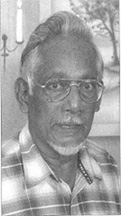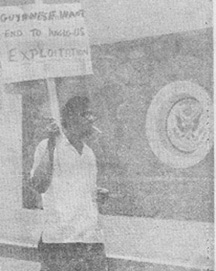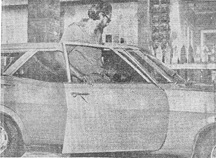Nigel Westmaas is Assistant Professor of Africana Studies at Hamilton College, New York, and was a former WPA executive member
By Nigel Westmaas
No one column or no one individual can piece together the many dimensions of Joshua Ramsammy’s life. There will be hundreds of vignettes and various memories of this charismatic guy with the deep, unforgettable voice. I was not of his generation and there are many of his friends and comrades who knew him far better than I. But all of those who knew him, from whichever angle, time, or phase of life, would unite on one unforgettable fact, Josh was a sincere, warm and brilliant man.

In one interview, Ramsammy recalled his chilling, near death experience: “As I was reversing to park in front of the bank, I heard a shot and smelt gunpowder. Then I saw a fellow in a car alongside aiming a pistol straight at my head…the first shot had hit a stanchion in the car and was deflected. My assailant was about to take a second shot, so I immediately dived to the floor. The shot went across and hit the glass on the passenger side. Next, he pointed the gun down at my prostrate figure and fired. The third shot hit and ricocheted off my hip; and because of the way my body was contorted, re-entered my abdomen, pierced my liver and right lung, and ended up near to my heart.” (Frank Birbalsingh, “The People’s Progressive Party of Guyana 1950-1992: An Oral History)”

Joshua was rushed to the Georgetown hospital by a fireman, Neville July, where he was operated upon in a valiant life saving effort by a team of doctors, among them his surgeon brother Herman Ramsammy.
There was remarkable social and civil response from many quarters to the shooting. What was significant about the reaction in Guyanese society to the attempted murder was the outrage, cohesion and solidarity of opposition groups, some of whom who did not see eye to eye with his political views, but found it necessary to join in solidarity over the Ramsammy incident. Ramsammy, who was active in Ratoon (founded in 1969 by Omawale, Andaiye and Maurice Odle and later joined by Josh and Clive Thomas) at the time of the shooting, courageously continued his work among the people and when Ratoon and other organizations and individuals merged to form the Working People’s Alliance (WPA), Josh was available in spirit and practice. Indeed, he was responsible for the title given to the WPA’s news sheet, ‘Dayclean’.

It is from his activism in the WPA that I, and other activists, came to know and appreciate Ramsammy. He served on many party committees, was active on the streets, and held the position of chairperson of the Executive Committee at one time. He campaigned tirelessly with the WPA in many parts of the country, but no place derived more pleasure than Berbice. For him it was always ‘home-going’. Many of us associated Berbice (especially Corentyne) with Josh and activists would look to him for strategic advice once that terrain was visited by members from other parts of the country. Ramsammy’s rich and deep accent brought back one striking memory for WPA activists during a campaign in Berbice in the early 1980s. This group fondly recalled Ramsammy’s refrain to hungry activists late in the evening, at the end of a hard day’s slog: “Grab a sandwich, lads”. The problem was that the location where Josh uttered the remark was miles from any eating house. His remark became the stuff of WPA camaraderie and ‘tantalise’. In later years, he would laughingly deny that any such comment was uttered.
His anger at repression and his concern for the people’s plight was manifest. At one public meeting in New Amsterdam, Ramsammy lamented the “effects of a decaying environment on the mass of the population, especially the youth” and called on the people “to arrest the decay of sanitation, drainage and healthy values taking place all around them.”
The last time I saw him was about two years ago in the company of Keith Scott, his good friend and co-founder with Ramsammy, of the National Democratic Movement (NDM), later the National Front Alliance. We had a drink somewhere and Josh looked a little tired and walked with a limp, but once at the table we saw the sparks of the Ramsammy of old. His wit, passion and compassion for Guyana all found a place in the discourse.
But there was evidence of something else. It would be a discredit to history and to Josh’s entire life and struggle to fail to mention this element of his personality. I refer to his conspicuous cynicism. This pessimism, I could only assume, emerged late in his life and was a reflection of his experienced sojourn with Guyana’s political and social decay. Keith Scott and Josh’s other friends can bear witness better than most on this Ramsammy phase. For me Josh’s cynicism was one of “been there, done that, with little effect; these folks and this process (through several regimes) are unlikely to change”.
For some reason, in thinking of Joshua Ramsammy and his great contribution to Guyana’s struggle, the following segment of a Martin Carter poem springs to mind:
Death and dreams are
warm. But also as cold as
the curses I utter about
myself. Often I repeat, I
have died and dreamed. And
when I see a green tree, I tremble.
Josh has lost the race of life, but won many friends and memories.




